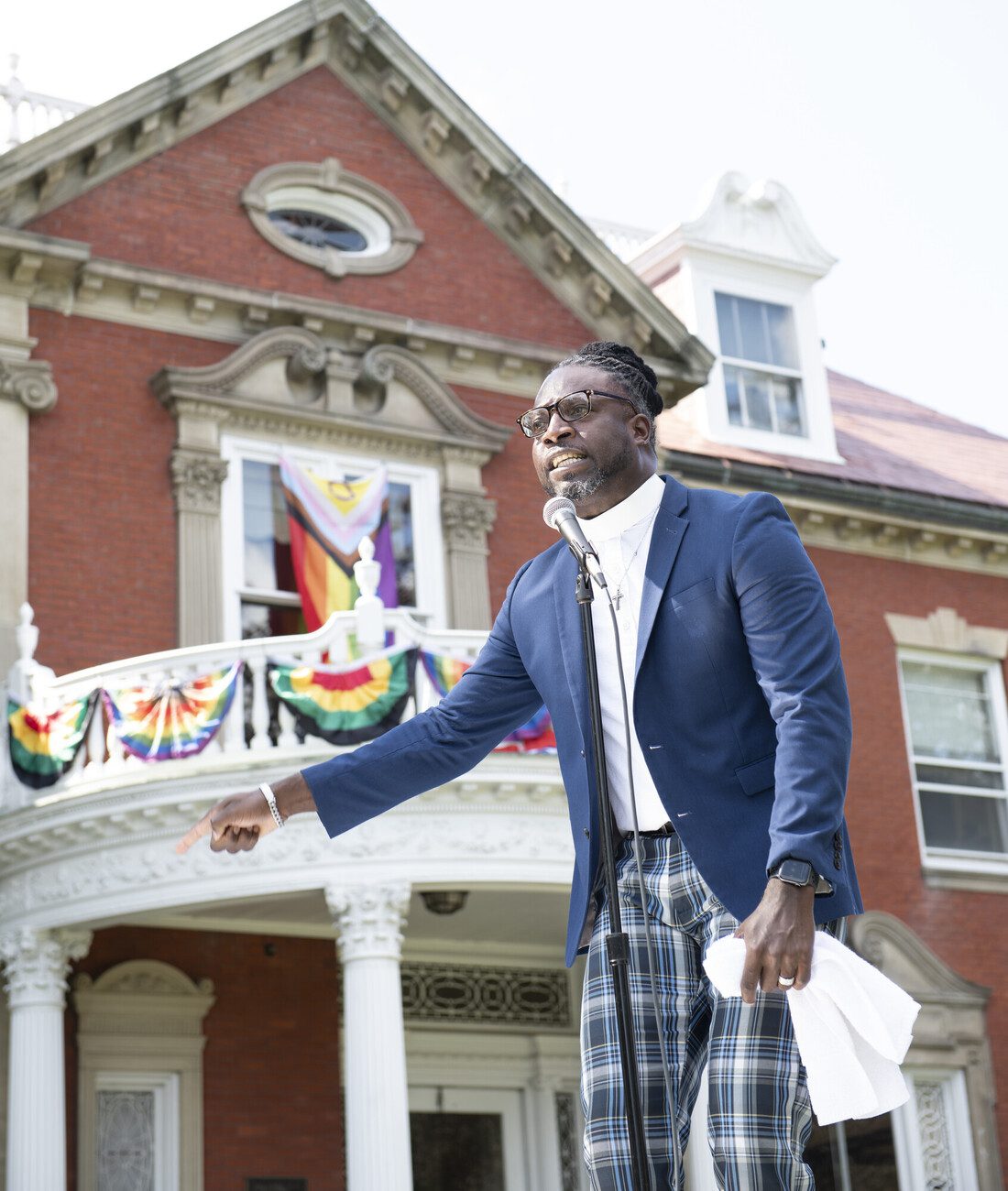SWAMPSCOTT — Scores gathered outside Town Hall on Wednesday for the town’s Juneteenth Jubilee — an afternoon of music, poetry, and public speaking centered around the concept of universal freedom.
Fire Chief Graham Archer kicked off the event with a speech about how Juneteenth commemorates the “real birth of freedom for this continent.” He compared the holiday to the Fourth of July, as both days celebrate the ideals of universal freedom and independence.
“It’s complicated for some of us. It should be for all of us,” Archer said. “It represents a new birth of freedom for our country. Juneteenth represents another step towards a more perfect freedom, towards a more perfect union. Juneteenth represents a really deep layer of freedom for a lot of people.”
Juneteenth commemorates the official end of slavery in the United States on June 19, 1865, when Union Maj. Gen. Gordon Granger informed enslaved African Americans in Galveston, Texas of their freedom two years after the Emancipation Proclamation was signed.
Police Chief Ruben Quesada delivered a brief speech thanking the town for the opportunity to help celebrate what he called “the most important day in our independence.” The event’s organizer; Diversity, Equity, Inclusion and Justice Consultant Tamy-Fee Meneide; then called Rev. Dr. Andre Bennett to the stage.
Bennett, the pastor of youth and young adults at Zion Baptist Church in Lynn, delivered a speech about Black Americans’ struggle for freedom in America centuries after June 19, 1865. He began by quoting Nina Simone’s song “I Wish I knew How it Would Feel to be Free,” before explaining the injustices he faced immigrating to the United States from Jamaica 15 years ago.
“I was free until I got here. [That] was the first time I understood and felt what limitations felt like,” Bennett said. “I dressed as best as I thought I could. I currently sit on not one, not two, but three Ph.D.s. I speak this way in every interaction I have and I was still being called boy by police officers in the presence of my 16-year-old daughter. I was still being pulled over in every corner. I was still being chased in the mall.”
Bennett went on to discuss the racial prejudice, inequality, and violence Black Americans still face today. He referenced the movement for affordable housing in Lynn.
“We don’t want better housing, we want equal housing. If you won’t live there, we shouldn’t live there,” he said.
“It is our belief that keeps us moving every single day when they murder us on the street, when they murder us in our temples, when they murder us in our synagogue, when they murder us in our place of comfort. It is our belief that someday, we too will enjoy the freedom that everybody else enjoys in this country that keeps us going. I wish I knew how it feels to be free,” Bennett added. “Swampscott, I come by not to stir up any trouble but just to let you know that we still have a lot of work to do.”
Bennett’s speech was followed by a vocal and electric bass performance by Swampscott High School student Aiden James, and a recitation of Amanda Gorman’s poem “An Ode We Owe.”
Speakers raised the Juneteenth flag to the tune of singer Sasha White’s rendition of “Lift Every Voice and Sing,” and award-winning poet Enzo Silon Surin read pieces from his book “American Scapegoat.”
“You ask if I’m afraid of dying, but I don’t have that luxury. I’m afraid of speaking, or walking, or running, or driving, or sleeping at night — of laughing too loud or talking too soft, lingering, loitering,” Silon Surin read. “Is there a place where Black men can go to be beautiful? Is there light there? Touch? Is there comfort or room to raise their Black sons as anything other than a future asterisk?”
Silon Surin’s son, rising fifth-grader Nicholas Surin, also recited a poem on what freedom means to him.
“Freedom means an inverted paradise. Freedom means an unwilling chrysanthemum. Freedom means life. So as I stand I think about how I am free like a bird flying with clear skies and no wind, don’t disrespect me. Don’t direct me. Can’t find, will find the truth in you as if I were the one to once be free,” Nicholas Surin read.
After the flag raising, Meneide closed the event with a brief message.
“Until our Black brother and sisters are free, we are not free,” she said.

